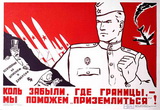In 1958, the made-up case of the “doctors-killers”
from 1953 was closed, as a result, the openly virulent Anti-Semitism subsided.
The newspapers and television spoke with enthusiasm about the
undivided friendship between the people of the USSR.
In truth, the various regulations limiting the advancements of Jews in every
sphere of life were not lifted at all (and stayed that way until Gorbachev
abolished them in 1987).
The word `Zionist` contiuned to be used as a curse word. The `Zionist` state of
Israel was potrayed as a cruel agressor towards its Arab neibours and a chrony
of the United States, the Cold War arch-foe. For that reason, no Jews in the
Soviet Union could be entrusted completely as they all might have had relatives
living in Israel.
At that time, I was the Head of Communications with a rank of a Major in the
unit that was a part of the standalone anti-aircraft division.
My regiment stationed in the town of Pavlovsk, a well-known suburb of St.
Petersburg (then Leningrad). My family, wife and two daughters, Svetlana and
Alla, lived in military housing nearby, enjoying the proximity to a big city.
One day, out of nowhere, a new order came in, stating that two regiments (out of
three) are to be relocated: one would go to Belarus, and the second one would go
to the Finnish border, to a village with an unpronounceable name of Njunjumjaki.
|

A Poster depicting surface-to-air missile system
and soldier pointing towars Gary Powers plane going down

surface-to-air missile system
С-75, circa 1958
|
For unknown to me reasons, the higher command decided that my regiment was going
to be moved to the border with Finland.
I was devastated. My children were attending a good school and had a lot of
friends whom they loved dearly. In addition, my youngest child, Alla, had
recently started a music school.
My in-laws lived in Leningrad, and my children often went to visit them and
stayed overnight. And now we have had to pack up and leave for a godforsaken
place without a regular school.
After some deliberations, I decided to pay a visit to the Lieutenant–Colonel,
the deputy commander of my division.
The deputy commander was a very affable person, and I always felt his goodwill
towards me (and, of course, his compassion was a result of his wife being of
Jewish origin).
Having explained my circumstances, I asked to be transferred out of
my regiment ( As a general rule, such transfers were discouraged, so I was
extremely anxious. )
I proposed to take a comparable position in the
regiment remaining in Pavlovsk while the officer currently occupying that
position to be transferred out to the regiment going to the border with
Finland... Perhaps, it was not fair to that officer, but I knew that his
situation with his children was not as critical.
To my surprise, the deputy commander asked me not to worry and, moreover,
assured me that he knew exactly how to solve the issue for me.
And sometime later, during informal meeting, he told me how he solved my problem.
All personnel decisions were made by the Colonel, the commander of our division, so the
deputy told him this: “In redeployed regiments, the new weapon - a rocket
surface-to-air missile systems should arrive (that was the type that in 1961
brought down the US scout plane, and its pilot, Gary Powers,
was taken prisoner). “ - he started -
“Why should we allow an access of this new super confidential weapon to Major
Ruvim Katz, who is a Jew?”
The commander of a division could not disagree with this argument, and to my
great joy, I was transferred to the regiment that remained in Pavlovsk.
|